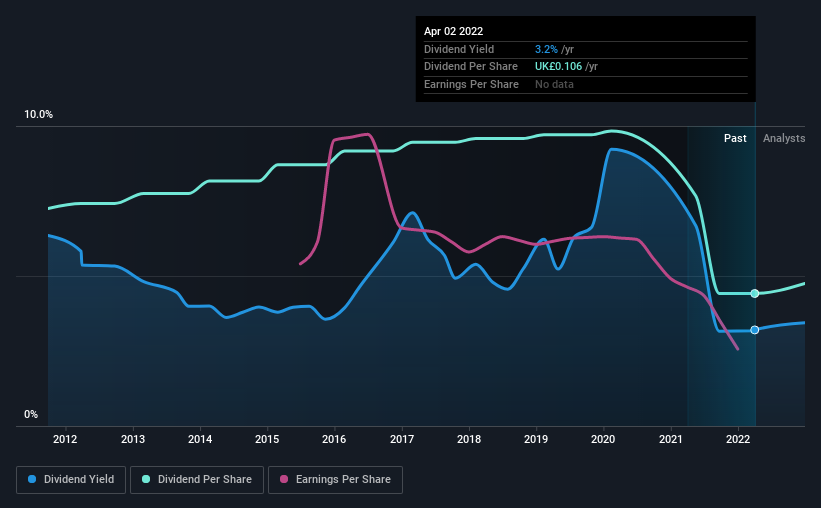Do These 3 Checks Before Buying Personal Group Holdings Plc (LON:PGH) For Its Upcoming Dividend
Readers hoping to buy Personal Group Holdings Plc (LON:PGH) for its dividend will need to make their move shortly, as the stock is about to trade ex-dividend. The ex-dividend date is usually set to be one business day before the record date which is the cut-off date on which you must be present on the company's books as a shareholder in order to receive the dividend. The ex-dividend date is an important date to be aware of as any purchase of the stock made on or after this date might mean a late settlement that doesn't show on the record date. Therefore, if you purchase Personal Group Holdings' shares on or after the 7th of April, you won't be eligible to receive the dividend, when it is paid on the 20th of May.
The company's next dividend payment will be UK£0.053 per share, on the back of last year when the company paid a total of UK£0.11 to shareholders. Looking at the last 12 months of distributions, Personal Group Holdings has a trailing yield of approximately 3.2% on its current stock price of £3.31. Dividends are an important source of income to many shareholders, but the health of the business is crucial to maintaining those dividends. So we need to investigate whether Personal Group Holdings can afford its dividend, and if the dividend could grow.
Check out our latest analysis for Personal Group Holdings
If a company pays out more in dividends than it earned, then the dividend might become unsustainable - hardly an ideal situation. Last year Personal Group Holdings paid out 92% of its profits as dividends to shareholders, suggesting the dividend is not well covered by earnings.
Generally, the higher a company's payout ratio, the more the dividend is at risk of being reduced.
Click here to see how much of its profit Personal Group Holdings paid out over the last 12 months.
Have Earnings And Dividends Been Growing?
Companies with falling earnings are riskier for dividend shareholders. Investors love dividends, so if earnings fall and the dividend is reduced, expect a stock to be sold off heavily at the same time. With that in mind, we're discomforted by Personal Group Holdings's 17% per annum decline in earnings in the past five years. When earnings per share fall, the maximum amount of dividends that can be paid also falls.
The main way most investors will assess a company's dividend prospects is by checking the historical rate of dividend growth. Personal Group Holdings's dividend payments per share have declined at 4.8% per year on average over the past 10 years, which is uninspiring. While it's not great that earnings and dividends per share have fallen in recent years, we're encouraged by the fact that management has trimmed the dividend rather than risk over-committing the company in a risky attempt to maintain yields to shareholders.
Final Takeaway
From a dividend perspective, should investors buy or avoid Personal Group Holdings? Not only are earnings per share shrinking, but Personal Group Holdings is paying out a disconcertingly high percentage of its profit as dividends. It's not that we hate the business, but we feel that these characeristics are not desirable for investors seeking a reliable dividend stock to own for the long term. All things considered, we're not optimistic about its dividend prospects, and would be inclined to leave it on the shelf for now.
Having said that, if you're looking at this stock without much concern for the dividend, you should still be familiar of the risks involved with Personal Group Holdings. To that end, you should learn about the 3 warning signs we've spotted with Personal Group Holdings (including 1 which shouldn't be ignored).
If you're in the market for strong dividend payers, we recommend checking our selection of top dividend stocks.
Have feedback on this article? Concerned about the content? Get in touch with us directly. Alternatively, email editorial-team (at) simplywallst.com.
This article by Simply Wall St is general in nature. We provide commentary based on historical data and analyst forecasts only using an unbiased methodology and our articles are not intended to be financial advice. It does not constitute a recommendation to buy or sell any stock, and does not take account of your objectives, or your financial situation. We aim to bring you long-term focused analysis driven by fundamental data. Note that our analysis may not factor in the latest price-sensitive company announcements or qualitative material. Simply Wall St has no position in any stocks mentioned.

